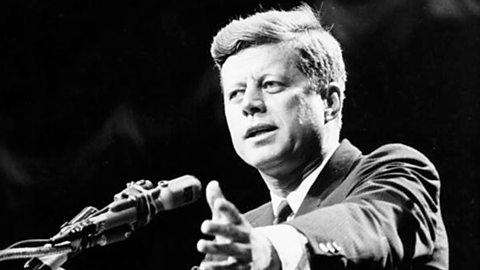A вҖҳNew FrontierвҖҷ
In 1960, John F Kennedy was considered to be a young and charismatic candidate for the role of president. He told the American people that the new decade of the 1960s would be the start of a new era for America and that he was the ideal leader. He won a very narrow victory against his Republican PartyOne of the two major American political parties. Republicans tend to hold a more conservative viewpoint on politics and society. opponent, Richard Nixon.
President John F Kennedy

John F Kennedy was inaugurated as president in January 1961. He was one of the youngest US presidents and well as the first Catholic president. His running mateA political partner chosen by the politician who is trying to get elected in US politics. Lyndon B Johnson of Texas, became his vice president. Kennedy first used the slogan вҖҳthe New FrontierвҖҷ in 1960 during a speech before he became president. The phrase then developed into policies for reform and change.
KennedyвҖҷs vision of the New Frontier was grand and broad.
- He encouraged Americans to be optimistic about the future, to look to science and technological innovation, such as setting the ambition for humans to reach the moon.
- He attempted to conquer problems relating to poverty, inequality and prejudiceForming an unfavourable opinion or feeling about a person or a group of people, without a full examination of the situation.
However, Kennedy achieved very few of his plans even though his party, the Democratic PartyPolitical party in the United States. Democrats tend to hold a more liberal viewpoint on politics and society. had a majority in CongressThe legislative body of the US government, made up of the Senate and the House of Representatives. This was because conservativePeople who prefer to keep to old ways and only reluctantly allow changes in traditional beliefs and practices. southern Democrats often opposed KennedyвҖҷs proposals.
Poverty
When Kennedy became president in 1961, the US economy was suffering a major recessionA time of temporary economic decline when trade and industrial activity are reduced. Farm incomes were decreasing while unemployment was rising. The unemployment rateThe percentage of the total labour force that is unemployed. reached a peak of around 7.1 per cent in 1961.
Kennedy did achieve some changes:
- he made available millions of dollars to businesses to create new jobs - companies received grants to buy new technology and train their workers to use it
- he increased the minimum wageThe minimum amount a business can legally pay an employee whilst working. from $1 per hour to $1.25
- he increased social securityFinancial assistance given by the state to individuals with a very low income or none at all. benefits to give more financial support to the elderly and unemployed
- he got a Housing Act passed that enabled people in deprived areas to access loans to improve their housing
- he established the Commission on Equal Employment Opportunity (CEEO) to make sure there were equal employment opportunities within government
However, there were also limits to what he achieved:
- KennedyвҖҷs proposed tax cut to stimulate growth was opposed in Congress but was passed after his assassinateMurder for religious or political reasons.
- his minimum wage reform only benefitted those who were in employment
- The CEEO only helped people who already had a goverment job and not the unemployed or those in other industries
- the use of new technology meant fewer workers were needed so there was still high unemployment, especially among African Americans
- the Housing Act was limited and the poorest people could not afford to repay the loans
Healthcare
Many Western European countries had created a public national healthcare system in the period following World War Two. However, in America the healthcare system was largely a private system. Therefore, Americans had to pay for medical treatment directly from their own money and savings.
At the time, mental health was often not seen as a priority. Americans with mental illnesses were often placed in state institutions for long periods. This area of healthcare received minimal funding and research, and so it was neglected by scientists and doctors. This was an issue close to KennedyвҖҷs heart as his younger sister, Rosemary, had been born with an intellectual disability. Kennedy set up a research task force to provide recommendations on how to improve this area of healthcare provision.
Education
Kennedy established the Peace Corps, an organisation that sends volunteers abroad to assist people in less economically developed countries. They worked as teachers, doctors, nurses and technical advisers. The Peace Corps was popular with young Americans and it was so successful that it still exists today.
In 1961, Kennedy wanted to introduce an education law that would increase federalPart of the government of the USA as a whole rather than relating to an individual state. aid to schools. Several groups opposed the idea, including southern Democrats, Catholics and Republicans. Southern politicians had previously clashed with Kennedy over civil rights. They were concerned that more money for education would lead to further desegregationRemoval of laws that separate people from different races in public places and day-to-day life. in schools. In 1962, despite opposition, Kennedy sent in troops and US MarshalsOfficers in the USA who enforce federal laws and respond to crisis situations. to protect university student James Meredith. Meredith was an African American man who became the first African American to enrol at the University of Mississippi and faced violence from racists.
KennedyвҖҷs assassination
In November 1963, President Kennedy was assassinateMurder for religious or political reasons. Most of his focus as president had centred around the Cold War. His policies related to US society are often criticised for not achieving much. However, after his death he was widely mourned as he had attempted to address issues such as poverty, inequality and prejudice. He spoke about his commitment to civil rights. His planned civil rights bill became law, after his death, with the passing of the 1964 Civil Rights Act.